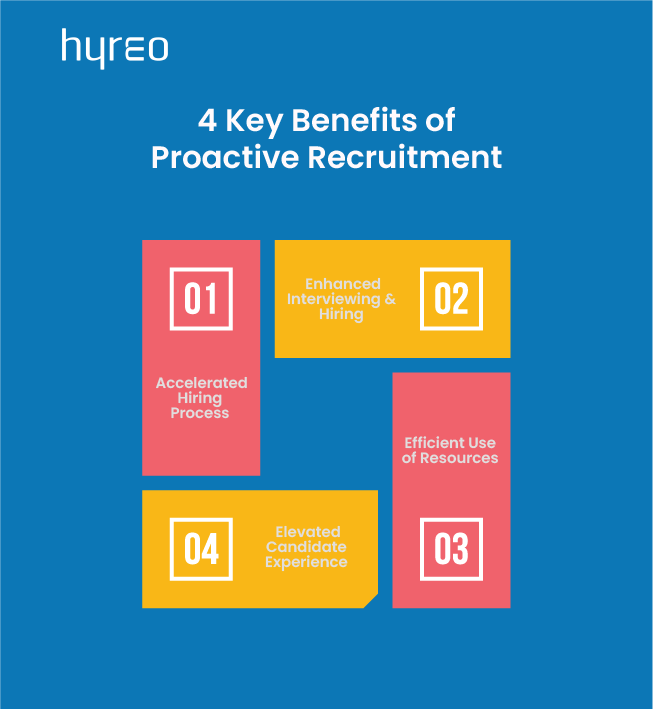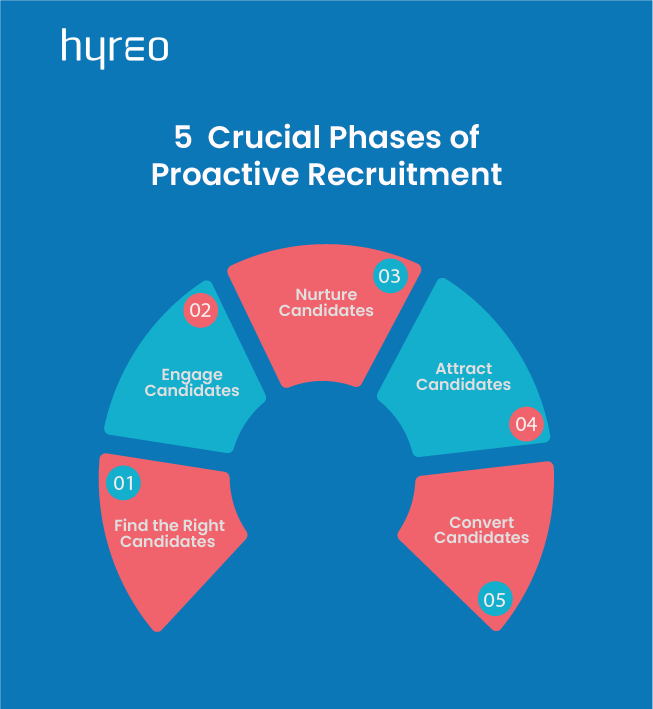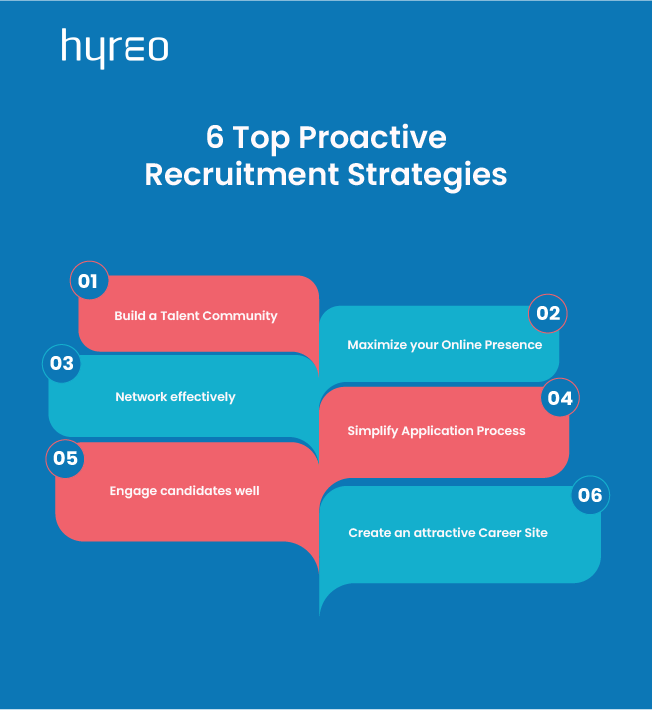If you have read the Harry Potter books, you would probably know how the death-eaters and Lord Voldemort made efforts to find Harry Potter. They followed him to the skies, put curses on him, and even got his professor to try to kill him.
To find the right talent, HR teams do not need to go to such lengths. All they need to do is be proactive and follow the proactive recruitment principles.
So what is proactive recruitment? Proactive recruiting is the process of making prospective employees aware of your company and its opportunities. It involves sending out company-specific job postings on social media, sponsoring industry events, creating a website for your business, and much more.
What is Proactive Recruitment?
The process of identifying and attracting candidates before they are actively looking for a job is defined as proactive recruitment. It’s an effective long-term strategy that helps you find the right people for your business, regardless of whether they are actively seeking work or not.
As a small business or startup, proactive recruitment can be instrumental because it allows you to find candidates who are the best fit for your company.
You don’t have to wait for people to come looking for jobs; instead, you can go out and actively seek out job candidates based on their skills, experience, and personality traits.
4 Benefits of Proactive Recruitment

#1 Minimal hiring time
The most apparent benefit of proactive recruitment is that it saves you time. By finding potential candidates and bringing them on board early, you don’t have to spend countless hours searching for the right person or dealing with the back-and-forth of interviews.
This, in turn, gives you more time working and strategizing your business than hiring new people. It also allows you to have a steady flow of new employees, which can help fill any gaps in your staffing plan.
#2 Improved hiring and interviewing
Another benefit of proactive recruitment is that it can make your hiring process more effective. When recruiting proactively, you’ll have a much easier time finding the right people for your company.
You can also focus on finding candidates who are a better fit for the position and your company culture overall.
#3 More efficient use of resources
Recruiters are valuable team members, so it’s essential to ensure they are not spending too much time on tasks like sourcing candidates and interviewing them one-on-one.
By focusing on proactive recruitment instead of just reactive hiring, you can save time and resources by not having to search for candidates on your own, then have them come in for interviews.
#4 Better candidate experience
Candidates are more likely to apply for jobs if they know they don’t have to go through an extensive application process and interview multiple people.
Streamlining the hiring process can reduce the amount of time and effort required while also making things easier for candidates.
This is especially true if you are trying to fill a job requiring a specific skill set or experience level, as it eliminates some guesswork in finding suitable candidates.
Proactive Recruiting vs. Reactive Recruiting
In the world of business, there are two types of recruitment. Proactive recruitment is when you are actively looking for candidates, and reactive recruitment is when you wait for candidates to apply.
Proactive recruiting is more effective because it allows you to find a better fit for your business by going directly after the right person rather than waiting for them to come to you.
This can also save money on overqualified applicants who may not be able to meet all of your needs, therefore wasting time and energy recruiting them only to realize later down the line that they weren’t right anyway!
The best part? Proactive recruitment costs less than reactive recruiting since it doesn’t require any upfront investment (such as advertising campaigns) before hiring someone new into your team – just start doing something now!
5 Crucial Phases of Proactive Recruitment
Proactive recruitment is identifying and attracting talent before the need arises. It takes place in five key phases:

#1 Find the Right Candidate
The most crucial stage is to find the candidate first. This means identifying people who are a good fit for your company culture and values, as well as their experience level and skill set.
This may require some research into the industry so that you can find out what types of companies are hiring and what kind of candidates they need. You may also require assistance from a recruitment agency or headhunting firm to help find suitable candidates for your company.
#2 Engage Candidates
Once you have identified a candidate who might be interested in the job, you must engage them and let them know they are being considered. This often involves phone calls, emails, and even lunch meetings.
The goal is to find out if the candidate is interested in the position and, ideally, why they are interested. You can also use these interactions to assess whether or not this person would be a good fit for your company.
#3 Nurture Candidates
After you have identified a candidate who might be interested in the job and have engaged them, it’s important to nurture them. This means following up with them regularly to let them know that you are still interested in discussing the position further and ensuring they are getting all of the information they need from your company to make an informed decision.
In this phase, you should answer any questions the candidate has about your company, the role, and the responsibilities that come with it.
In addition to providing this information, you should also let them know when they can expect an official offer letter and clarify what happens if they are not interested anymore.
#4 Attract Candidates
This is the phase where you will put your company’s best foot forward. This is where you want to make sure that the candidates know how fantastic working at your company would be, from the excellent benefits package to the fun atmosphere.
Basically, whatever it takes to draw them in and get them excited about what they could be doing if they accept your offer.
#5 Convert Candidates
This is the phase where you want to ensure that the candidate has accepted your offer. It’s essential to get this done as soon as possible so that you can move on with the hiring process.
But it’s also essential to make sure they know they have options and aren’t being pressured into accepting right away if they don’t have time or are still looking at other companies.
6 Proactive recruitment Strategies

#1 Building a talent community
Building a talent community is one of the best ways to proactively attract and recruit top talent. A talent community is a group of people who are interested in your company, industry, or field.
Creating a talent community helps you stay on top of what’s trending in your industry so that when it comes time to post jobs or reach out directly to candidates, you can tailor your messaging to their interests and connect with them on a personal level.
You can create a blog, host events, and share industry-related content on social media. For example, if you are looking for software engineers with experience in mobile development, you could write a post about why you think mobile development is essential to your company.
Then share that post across your social media channels and with email subscribers. By engaging with people who are interested in the topic at hand—in this case, mobile development—you can build relationships with them over time and eventually ask them to apply for jobs when they become available.
#2 Maximizing your online presence
Creating a solid online presence is the best way to find talent for your company. This includes building a website and social media channels, as well as blogging about industry trends and news.
Sharing this content with your audience gives them an opportunity to learn more about your company—and when they are ready for a job, they might think of applying with yours first. It also allows you to collect data on what your audience is interested in so you can tailor your content even further.
#3 Networking effectively
Networking is one of the best ways to find qualified talent. When you talk to people in your industry, it’s easy to get ideas for how they might fit into your company. Even if they don’t, they may know someone who does and can make an introduction.
You can also attend industry-specific events like conferences and seminars where you can meet potential candidates face-to-face, or consider hosting an event of your own so that people will come specifically to meet with you.
#4 Creating an easy application process
Creating an easy application process for potential candidates will help you get the information you need, but it also helps build trust between you and the potential hire. If they have to write an extended essay about their skills and experience or answer a series of questions about what they want from working with your company, it might seem like too much work for them.
Instead, consider creating an application process that only requires a resume and cover letter. This will give you the information you need to make an informed decision about whether or not this person is right for your company, but it will also help build trust between you and the applicant.
#5 Maintaining communication with candidates
As a recruiter, you are likely sending out quite a few emails. And if you are like most people, you probably send duplicate old emails to every candidate. Unfortunately, this can make your job as a recruiter seem impersonal and unengaging.
Instead, try sending candidates specific content related to their experience and interests to help build trust between yourself and them. This could be anything from job descriptions of roles they might be interested in to industry articles that mention some of the challenges your company faces.
For example, Unilever sent out a survey to candidates that asked them what their biggest career challenges were and why they were looking for a new job. The company then shared the results with its employees, along with an analysis of how they could help each candidate overcome these challenges.
This tactic helped Unilever build trust by showing candidates that the company was interested in them as people rather than just potential hires.
#6 Creating a career site that appeals to and attracts candidates
It gives potential candidates a behind-the-scenes look at what it’s like to work for you. One of the biggest complaints recruiters hear from candidates is that they want to know more about the company and what it’s like to work there. Your career site is an easy way to showcase your culture, values, and internal communications.
It can serve as an extension of your brand and give candidates a better sense of who you are. The more interesting, helpful, and engaging your career site is, the more likely it will help attract candidates who are a good fit for your company.
Wrap Up
Proactive recruitment is identifying and recruiting employees before they leave their current job. It’s not just about getting your foot in the door; it’s about being prepared to hire whenever an opportunity arises.
FAQs on Proactive Recruitment
What are 5 recruitment strategies?
The most common recruitment strategies that companies use include the following:
1. Job boards and networking sites are the most popular way to find candidates, with 83% of recruiters saying they use these channels.
2. Employer branding is the second-most popular strategy; many recruiters incorporate it into their efforts. Employer branding aims to attract a pool of qualified applicants that fits your company’s culture and values.
3. Social media is another popular recruitment tactic, using platforms like LinkedIn, Twitter, and Instagram for hiring purposes.
4. In-house recruiters are also popular, with 71% of companies using them to hire candidates.
5. Candidates who go through a recruiter are more likely to be hired than those who apply directly.
How do I become proactive in recruiting?
The best way to become proactive in recruiting is by creating a culture of engagement. That means creating an environment where employees are encouraged to share their ideas and opinions with one another, as well as actively listening when they do so.
Creating this environment will help you attract suitable candidates who want to work for your company’s values.
Why is proactive recruitment important?
Proactive recruitment is essential because it allows you to find and hire the best candidates for your company. It also helps you control your talent pipelines so that you are not always scrambling to fill open roles.
In addition, proactive recruitment can help reduce employee turnover by creating an environment where employees feel valued and appreciated.
What is the difference between proactive and reactive recruitment?
Proactive recruitment is when a company actively seeks out and recruits candidates for open positions. Reactive Recruitment is when a company only hires candidates who have already applied for a job or were referred by an employee. While it’s important to be reactive, being proactive will help you attract the right talent.
What is a recruitment strategy plan?
A recruitment strategy plan is a document that outlines your company’s approach to recruiting. It should include the goals you want to achieve by using it and how it will help your business grow. A recruitment strategy plan can help you recruit top talent promptly, streamline the process and save money on hiring fees.
Why is recruitment strategy important?
A recruitment strategy is essential because it helps you attract the right talent for your company. If you are looking to hire a new employee, it’s essential to know how they will fit into your team and what value they can add. A recruitment strategy plan can also save time by eliminating unnecessary steps in the hiring process.
What is the process of Recruitment?
The recruitment process is a series of steps that you take when looking to hire new talent. It begins with developing a job description and posting it on various job boards and social media sites in order to attract candidates.
Then, once the right candidate has been identified, you’ll need to conduct interviews with them, during which they can tell you about their skills and experience and why they would be a good fit for your company.
What is the most effective method of recruitment?
Proactive recruitment is the most effective recruitment method, as it allows you to attract candidates interested in working for your company. As a result, you will have a much easier time filling positions and hiring qualified workers.
It also allows you to communicate your company’s mission, values, and culture to candidates. When you are not proactively recruiting, you may end up with people who aren’t a good fit for your company—or worse yet, don’t even know what they want out of their careers!
How can proactive recruitment help you?
Proactive recruitment can help you find the best people for the job. When you proactively recruit, you are not just trying to fill a position—you are also looking for someone who will fit in with your company culture and values.
You want someone who will be excited about working with other members of your team and someone who can add value by bringing new perspectives to every project they work on.



